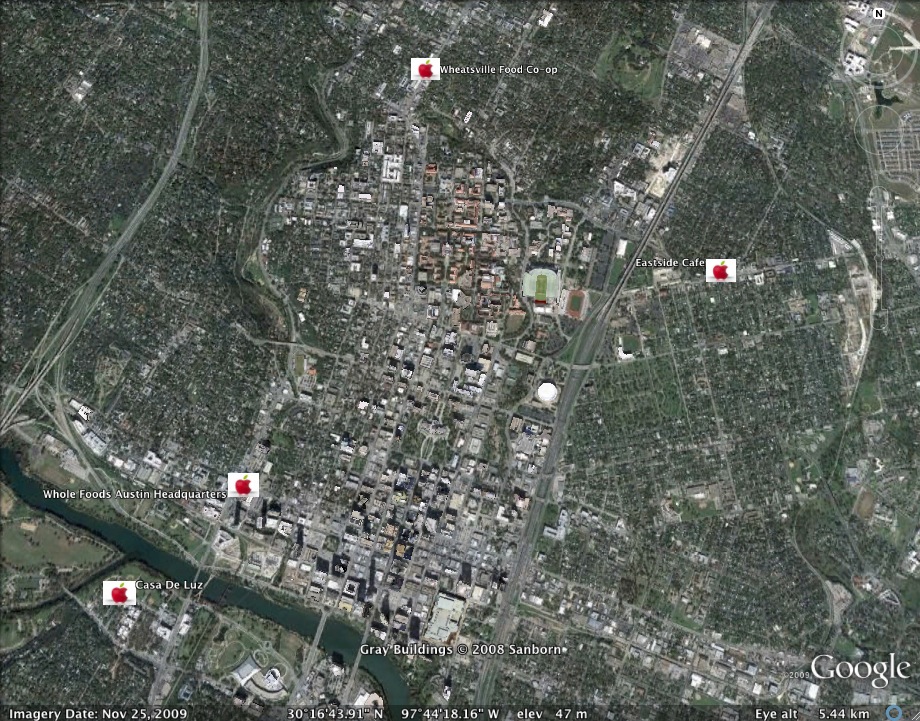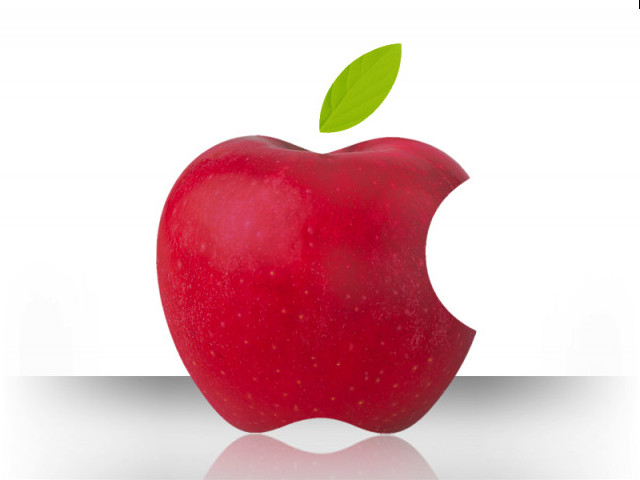
(Image credit: Image capture from Google Earth; data created by Laura)
Caroline and I are doing our Google Earth collaborative
writing workshop this week. We put
the finishing touches on the assignment a couple weeks ago. The above image provides a sample of how our students will map their controversies. (I've chosen some local Austin sites that are relevant to food politics for my sample map: the corporate headquarters of Whole Foods; Casa de Luz, a macrobiotic restaurant, community center, and preschool; Wheatsville Food Co-op; Eastside Cafe, which grows its own ingredients; and Kerbey Lane Cafe, a local 24 hour diner that offers seasonal menus based on locally-grown ingredients.)
After much discussion, we decided to take a middle road with
the map’s subject matter: we wanted our students to be collaborators on determining
the map’s actual content—what will appear on it—so we didn’t want the
assignment to dictate the content (e.g., “Make a map of Austin grocery
stores.”). But we also
reconsidered having our students simply map their own research. While we still believe that mapping
their semester data would be useful for visualizing and reconceptualizing the
results, we were concerned that this approach might not really create new
writing, and “mapping as writing” is an important way we think about this
activity.
For
these reasons, Caroline and I are each taking our
students through a brainstorming session on Day 1 of the activity
(Monday, for
Caroline’s class; Tuesday, for mine).
We’ll ask our students to define what places must be on our class map
in
order to “map our controversies.” Our
brainstorming session will answer this question widely, including
results that
have emerged from students’ independent research and also other
results. In other words, students may
argue that it’s important to include the corporate headquarters of
Monsanto, or
the Food and Drug Administration offices, or the major corn syrup
refineries in
the United States. But in addition
to these topic-specific sites, we’ll also ask, what else needs to be on
our map
to create a fuller picture of food politics? What farms? What chemical
plants? What international sites? In this way, we’ll populate the map
with an eye to drawing a
rich picture of the sites that make up and participate in our
controversies,
including, but going beyond the discrete topics themselves.
From this point, students will each adopt three sites for
which they’ll be responsible for placemarks. They will then fill out a “Placemark Data Collection
Worksheet” for each site and will, later this week, finally enter their data
into Google Spreadsheet Mapper. By
the end of the week, both classes will be able to view our combined results in
one big map.
Caroline and I personalized the template to make each
class’s placemarks look different.
My class’s placemarks will be indicated on the map by this icon:

(Image credit: Joseph Darnell)
By distinguishing between the two class’s placemarks, we’ll
be able to do some cross-class comparison. We’ll ask, How do the
classes’ maps compare? Are there marked differences in the two
sets of placemarks? What does this
suggest about how each class community is thinking and talking about
food
controversies?
Caroline and I outlined these main goals for the workshop goals:
- As
our students have spent the bulk of their time on written/verbal rhetoric, we
want to introduce the students to visual rhetoric in a way that integrates with
and builds upon their other coursework.
- As
much writing outside of the university involves collaboration, we want students
to experience how writing and revision operate when they occur within a
community and to rethink authorship within such a writing environment.
- As
coursework can often feel disconnected from reality, we want students to associate
their controversies with particular images and locations and thereby
(re)experience their writing as co-extensive with their lives as citizens and
individuals.
We should be
able to let you know how it turns out by next Monday.
Recent comments
2 years 29 weeks ago
2 years 44 weeks ago
2 years 44 weeks ago
2 years 50 weeks ago
3 years 4 weeks ago
3 years 4 weeks ago
3 years 4 weeks ago
3 years 6 weeks ago
3 years 6 weeks ago
3 years 6 weeks ago